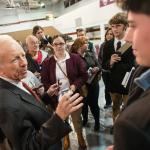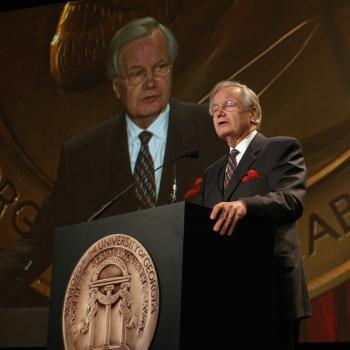
The Christian church in 21st-century America is filled with false prophets. They have always been with us but now seem to be everywhere we look – our phones, computers, televisions, online bookstores…. even our own churches. False prophets say they speak for God, but many teach false theology. They tell us what we want to hear and may look and sound the way we do only better. But they are dangerous. So, how do you recognize a false prophet when you see one?
The most well-known biblical verse about false prophets is probably Matthew 7:15-17 (NLT), which warns us of wolves in sheep’s clothing:
15 Beware of false prophets who come disguised as harmless sheep but are really vicious wolves.
16 You can identify them by their fruit, that is, by the way they act. Can you pick grapes from thornbushes, or figs from thistles?
17 A good tree produces good fruit, and a bad tree produces bad fruit.
Myths & Lies from America’s Pulpits
I have tried to use my posts on Patheos for good purposes and have written quite a few articles on this question: how do you recognize a false prophet?
My article Beware of Televangelists & Wolves in Sheep’s Clothing describes how all too many televangelists deceive people who sincerely want to hear the gospel, never dreaming they will fall into the clutches of con artists.
One article that I wrote less than a month ago – Unveiling the Lies Behind Christian Nationalism — reveals a lie that’s sweeping some segments of the country: That the founding fathers created a Christian nation for Christians. I won’t rehash the article here, but I do debunk several myths and lies about our nation’s beginnings and the dangers of Christian nationalism.
Another of my articles is Racism & Radicalized Christianity in America, which looks at myths and lies put forward by radical right-wing preachers from the pulpit.
Rob Dalrymple, who also contributes to Patheos, has written an excellent article, Everyone Loves False Prophets, about those who preach that we live in the end times. Many of these false teachers and preachers even provide a specific date for the world’s end. And they have smooth explanations about why we’re still here when their prophecy is wrong.
Jack Wellman is another Patheos contributor who has written about false prophets. Check out his post, Politicians and False Prophets, because it’s worth reading. Wellman is a pastor and writer who seems to know a false prophet when he sees one.
So, How Do You Recognize a False Prophet?
False prophets say they speak for God but listen again….
They make a public show of aligning themselves with God, but their ideology is false.
Noah Adams, lead pastor at City Park Church in Fort Collins, CO, poses an important question in his post 10 Characteristics of False Teachers: “When was the last time you thought about false teachers in the church?” And he encourages Christians to ask themselves whether there is false teachings or prophecies in their own churches.
“If false teachers/false teaching is never openly discussed, warned against, or rebuked, we run the risk of slowly but surely allowing ourselves to be influenced (or overcome) by false teaching.”
Adams also warns that false teachers are “masters of disguise and manipulation and purposely masquerade as true believers, but their faith is not real.”
False prophets tell us what we want to hear.
Televangelists like Joel Osteen and Creflo Dollar preach the prosperity gospel week after week. They are attractive, dynamic and charismatic speakers who tell people, that God wants you to prosper! You too will become rich if only you pray hard enough for wealth. And be sure to tithe to this church! And don’t forget to buy my latest book!
The prosperity gospel “is a fast-growing movement frequently associated with Pentecostalism, evangelicalism and charismatic Christianity that emphasizes believers’ abilities to transcend poverty and/or illness through devotion and positive confession,” warns the Harvard Divinity School.
It should surprise no one that the prosperity gospel is popular in poor communities. Followers imagine better lives for themselves if only they tithe heavily to a specific church or subsidize their pastor’s affluent life.
But poor people aren’t the only ones who fall prey to this false teaching. “Members of the socioeconomic elite may also be drawn to PG messages, which affirm the religious and spiritual legitimacy of wealth accumulation and reinforce a worldview in which financial success is an indicator of moral soundness,” the divinity school says. Financial success means no such thing.
False prophets often blend in with the crowd, though there are exceptions.
Noah Adams says most false teachers and prophets can be difficult to spot because “They blend in, look like everyone else, and no one usually looks twice at them. Then, when opportunity strikes, they begin to influence a church negatively.”
Adams adds, “The false teachers we ought to worry about are not the loud obvious ones; they are the quiet, sneaky ones that operate under our noses without detection.”
They ingratiate themselves with members. Someone asks them to teach a Sunday school class, lead a Bible study or take a leadership role in a church. And they quietly begin to introduce ideas that aren’t biblical.
“Most false teachers will look on the outside like authentic followers of Christ. Jesus himself says that they will look like sheep on the outside, but on the inside, they are wolves seeking to destroy,” Adams points out.
Church members become convinced these charlatans are genuine and just what their church needs to retain members, bring in new ones and grow. But when the congregation honestly looks at their “fruits,” as the Bible says, they will discover wolves in sheep’s clothing,
False prophets twist scripture.
“They are masters of convincing people that they are teaching biblical truth when in reality they are teaching falsities or half-truths, which are often more dangerous than complete falsities,” says Noah Adams.
“Churches must be on guard against false teachers. If we do not keep our eyes open, focus on the truth of the Bible, and consciously rebuke false teaching when we encounter it – we run the risk of being led astray or perhaps even completely overcome by wolves and the schemes of evil,” he explains.
False prophets may have a political agenda.
And now, we come to a major problem in the American church — the union of religion and politics – and to the dangerous road we follow when we bring the two together.
As the Brookings Institute says, when churches get into bed with political leaders, they are “no longer speaking for God.”
A Secular “Prophet”
One false prophet in American society isn’t a prophet in the usual sense of the word. He’s a secular politician who has convinced millions of Americans that he’s their political savior.
Donald Trump is a pathetic man with a string of failed business ventures to his name, as well as a failed presidency, three marriages, numerous affairs and a long list of alleged crimes. In a nation where religion and politics go hand-in-hand, he is the ultimate false prophet from a secular perspective.
“Trump weaponizes Christianity to seize power for himself,” says Faithful America, an interdenominational group of Christians who “are sick of sitting by quietly while Jesus’ message of good news is hijacked by the religious right to serve a hateful political agenda.”
The organization points out that Trump has openly criticized the faith of those who criticize him, mocked pastors who support him behind their backs, and even ignored Jesus’s teaching to ask for forgiveness and love his enemies.”
Holy Week Irreverence
But Trump outdid himself during Holy Week when he compared himself to Christ while hawking a $59.99 “Bible.” (I’m not sure you can call it a Bible, given all of Trump’s add-ons.)
You can buy a Bible at Walmart, Amazon or many dollar stores for much less than Trump’s asking price. Admittedly, those Bibles don’t contain Trump’s “God Bless the USA” tagline, but they do contain God’s message.
“Happy Holy Week!” Trump said when he introduced the book. “Let’s Make America Pray Again.” Really? “I encourage you to get a copy of the God Bless the USA Bible. It’s something everyone should have,” he told his true believers.
He compounded the sacrilege by including the U.S. Constitution, the Bill of Rights, the Declaration of Independence, and the lyrics to part of Lee Greenwood’s song, “God Bless the USA.” And he made the pitch while in court over hush money he allegedly paid to adult film star Stormy Daniels.
The Constitution and the other documents are important, and Greenwood’s song is okay, as well. But not in the Bible.
Yet, Trump’s worst sacrilege was still to come. Just in time for Easter, Trump compared his numerous legal battles to Christ’s crucifixion. If you are a Christian, stop here and think about this comparison for a minute. I mean really think about this blasphemous statement by a failed businessman who flaunts the law and admits he has never repented for anything.
It would be akin to comparing yourself to Yahweh when speaking to Jews or to Allah when speaking to Muslims. It is that offensive to many Christians.
Trump’s Easter incident wasn’t the first time he has depicted himself as a Christ-like martyr. In a recent speech to the conservative National Religious Broadcasters, he was quoted as saying, “I’ve been very busy fighting and, you know, taking the, the bullets, taking the arrows. I’m taking ‘em for you…. I’m being indicted for you.” (How can that be? I haven’t broken the law.)
And to answer the question I asked at the beginning of this article — how do you recognize a false prophet? – the answer should be easy with Trump. Look at the man, his lack of character and beliefs, his treatment of other people, and his “fruits” as the Bible calls them. No, he shouldn’t be difficult to identify as a charlatan or false secular prophet.
Messianic Hopes & Poor Outcomes
“History teaches that messianic hopes lead to poor outcomes for the societies that embrace them. Yet, they continue to surface – even today, with the elevation of Donald Trump by some to messiah-like status,” says Kimberly Stratton, an associate professor of humanities and religion at Carlton University in Ottawa, Canada.
In her post From Bible Times to Trump, False Messiahs Have Doomed Societies, she says, “Trumpism has all the hallmarks of previous messianic movements in subordinating reality to mythology; they failed and in the process destroyed the societies they aspired to save.”
The Israelites in the Old Testament didn’t fare very well when they followed false prophets or worshipped false gods, either.
Whether we’re considering false prophets from a religious perspective or a secular one, the outlook isn’t a good one. We need to know how to identify them, and when we spot one, we need to run like hell.













